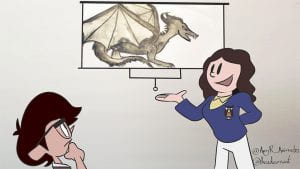The students are presented with a problem, challenge or adventure. This is the new subject that they are required to understand, the new skills they have to master, and the new knowledge that they need to make sense of and incorporate into their existing knowledge structures. In practice, this point in the journey will be about presenting the unit to the students – setting out the aims and purpose, what they will learn, how they will be taught, what is expected of them, the intended learning outcomes and the assessments (if appropriate). It may be about explaining the dangers and likely pitfalls that may crop up on the adventure, but there should be a strong focus on the rewards of the journey too.
Diagnostic questions for stage ii):
- What will your students be able to do as a result of studying this unit with you?
- What are the big/major/important questions that will this unit raise, or that this unit is designed to help students answer?
- What is the core challenge/promise/intended learning outcome for this unit?
- How is the challenge/promise of the unit presented to the students? Do you clearly brief them on it, or is it somewhat hidden? If you choose to hide it, what is the reason for it?
- How are you setting expectations – do you clearly state what is expected of students? Do you start with a task that ‘talks the talk’? (And if you do, do you explain to the student in retrospect?)
- Does this unit contain tasks and/or assessments? (If not, how will you know that your students are learning?) Are these formative or summative? How do you explain to the students what they should be doing, how they get feedback on it and how and if it gets judged (and by whom)?
- Do you explain or model the journey as a whole and explain how this unit fits into it?
- Do you explain your teaching philosophy (your approach to teaching) to students? (Why have you chosen to teach in the way that you do, and what evidence do you have that your teaching approach works? Have you written, or might you consider writing, a teaching philosophy statement?)
- If you’re adopting a pedagogical strategy or approach to teaching with which students may be unfamiliar, how do you explain or ‘sell’ this to your students?
